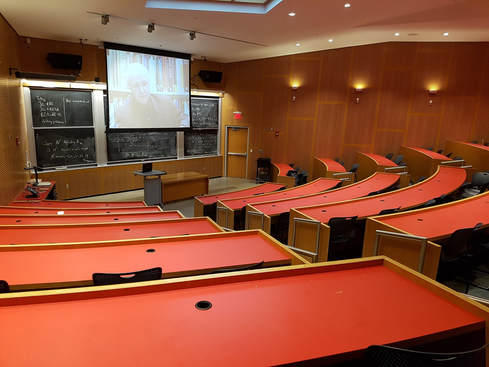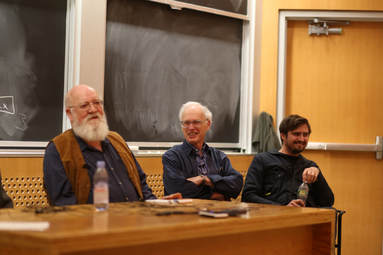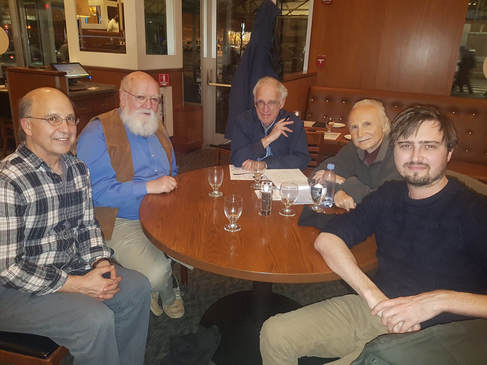Psi
Menu
V - RAISING AWARENESS
(Sept 2017 - April 2018)
(Sept 2017 - April 2018)
Chapter 28
Universities: FAIL (Except MIT)
Universities: FAIL (Except MIT)
|
Aside from festivals, the other avenue I was hoping to share my film in was universities. I thought the film, and possibly the Talks series too, could serve as the basis for interesting conferences with the involvement of both the experts in the film (who had agreed to take part in such events were they to be organized) and with local professors/intellectuals who could gather for a round table and Q&A with students. I e-mailed a bunch of universities in the US and a few in the UK, specifically their philosophy, physics and filmmaking departments, with this idea.
And I did get some replies. All of them were: thank you but no thank you. As with the lack of interest from journalists, this was surprising to me - and again, I don't know if this was just me being naïve or if I was right to feel underappreciated. I had spent enough time in universities to know what kind of events usually get organized and which ones are interesting to students, and it looked to me that what I was offering was a pretty decent idea. So I couldn’t quite figure out why the reaction was so negative. Was it that schools didn’t want to be seen as promoting a film? Did they think the project wasn’t interesting enough? Maybe the fact that I personally reached out to them (rather than say a representative or a producer) projected an amateurish or profiteering vibe? I couldn’t really tell. And then, I received one e-mail that perhaps provided a potential explanation for this cold shoulder, from a female philosophy professor I won’t name at a major US university, who I was referred to by another professor at that same university, and who simply wrote: |
|
And there it was. In a flash, her message made me feel at once insulted and shameful. Insulted because I felt my hard work was being disregarded for an unrelated political cause and I certainly didn’t like the insinuation, which I viewed as wrong, that I was a sexist perpetuating the patriarchy. And shameful, because I also realized that I had legitimately messed up. My film undeniably had a gender imbalance problem.
The gender imbalance
In all honesty, I had not perceived this issue while making the film. It’s only later, when building the website for the project and making a page presenting the 9 experts with their pictures side by side, that for the first time it became patently obvious to me: they were all men, all white, and predominantly over 50. My computer screen was screaming feminism. But at the time, again, I sort of brushed it aside, thinking perhaps I was the one making too big a deal of it.
But then later down the road, in 2017/2018, this aspect became impossible to ignore in the wake of the Harvey Weinstein scandal, followed by the Me Too and Time’s Up movements and more generally a widespread social awakening about gender issues and diversity. For sure, before all that happened, I had been naïvely blind to this aspect of the film while making it. And perhaps that, in itself, is legitimately a cause for concern. Perhaps my inability to even pick up on the issue beforehand was a symptom of privilege. But at the time of contacting the experts (among which were some women, I should say), I was just so caught up in the struggle of actually making this film that I didn't worry about anything else that just getting some replies - and truth is, I didn’t think I stood a chance of getting any positive response at all. So when those who replied agreed to meet with me (and they happened to be only men), I was just so thrilled I went with it as it happened - I didn't stop to think: wait a minute, it's great these guys have said yes, but I should turn a few of them down because I need women in this project. And this was, essentially, my only line of defense: I had no intention of not representing women in the film, it’s just that the first people to reply to me were men who I didn't expect would ever get back to me in the first place, and once I had 9 lined up (which was already a lot), I stopped contacting people and got on with it. If I could go back and do it all again, having learnt what I have since making the film, I would surely be more aware of gender balance and more careful in the way I cast the film. Because, yes, the film would have benefited from a more diverse group of experts, and I do believe that promoting such diversity in films (especially in "scientific" films) is invaluable to help change perceptions about gender roles and ultimately modify how social institutions work. But I can’t go back in time, and I can’t either say I’m unhappy with the cast of experts I have. Because I’m not. I think every one of them is great – and the fact that they are white men doesn’t deter from the fact that they are legitimate experts in their field and what they have to say is very interesting. I didn't contemplate re-doing the film with a more diverse cast for several reasons: first, it would be too costly. Second, by this time, I was exhausted by the whole project and I just couldn't bring myself to go back for interviews and re-edit the whole thing. And third, doing so would require cutting some of the experts from a work that I spent years putting together - and that didn't feel right either. Ultimately, the film is the way it is, with its strengths and weaknesses, precisely because of every little contingent event that happened along the way and shaped it (including my own ignorance). I just wasn’t aware that I was missing a problem, or stepping right in it. And that may have been my prime mistake. To fight unconscious bias, you have to make a conscious effort to be more inclusive. That’s what I didn’t do. And that’s what I’ve learnt for the future. I don’t know how much this aspect has played on the film's reception by universities, and by people more generally for that matter. In my mind, the idea of organizing events in universities was precisely an opportunity to hear more diverse voices on the topics at hand, with local professors hosting and being part of the conversation with students (I put this forth in my reply to the female professor who raised the issue with me. She never replied). Barry Schwartz was really a strong supporter of this idea, offering to take part in events on the West Coast of the US and to bring in other experts from Berkeley, where he was now teaching. He wrote to major event organizers in the Bay Area, promoting psi and offering to take part in talks and conferences with a variety of leading speakers, both male and female obviously – only to never get any further than "Thank you, sounds great, tell us more" then silence. Again, from my point of view (and his), very disappointing. The MIT Screening
In February 2018, finally there came some good news: Alex Byrne, a British philosopher who was head of the philosophy department at MIT, contacted me. He had got wind of my project and wanted to host a screening of the film at MIT, for students and the public, followed by a Q&A with the philosophers in the film who could make the trip. Obviously, given the earlier reception I was getting, I was overjoyed about his invitation. I did everything I could to get it all sorted out and accommodate some of the cast so they could make it. The event was scheduled on April 4, 2018 at the MIT Stata Center. Bob Doyle and Dan Dennett who both live in the Cambridge area attended, as well as Robert Kane and Alfred Mele who flew in from Austin and Tallahassee respectively.
|
|
The screening went well. It was in one of the large conference rooms, with perhaps around 100 attendees. I stood in the back, watching the film for the first time with an audience of strangers, and readying myself to face the unknown. It was a weird feeling: I was proud to be showing my film at such a renowned institution, excited to be finally sharing the film with more people than could fit on a couch, but worried because they didn’t know me and had no incentive to be nice afterwards.
The post film Q&A lasted almost 90 minutes and I’d say that 90% of the conversation was positive, with questions directed mostly at the guests, and a few at me. I was also reminded on this occasion that I’m really not comfortable speaking in front of an audience. Maybe this is something that you learn with practice. But I had long noticed – as an aside – that this was one major difference between American/English kids and French kids, of all ages (and I had long wished to have developed my English side more on this one): the ability to speak publicly in front of a crowd. I’ve witnessed both the Americans/English and French, of all age groups, taking a mic, or a stand, and speaking in front of people - in schools, universities, graduation parties, office presentations, conferences, weddings, etc. – and invariably, the Americans/English always seemed to perform far more comfortably and naturally that the French. I’m not sure what to put this down to – I think it goes back to childhood, where the English educational systems are more “performative” and confidence-building than the French one. Anyhow, I said 90% of the Q&A went well. But it’s the other 10% I will remember most vividly. Half way through, an old guy who looked like a scruffy Bernie Sanders stood up and began rather politely:
“So the film is about how you struggled in your life because you don’t know what path to chose, be a lawyer or a filmmaker, a lawyer or a filmmaker? Honestly: who gives a fuck? Go show this movie in a blue collar neighborhood or a community college, I’m not sure many people will respond to it.” Ouch. The old guy even tried to get the crowd on his side, assuming he probably wasn’t the only one to feel insulted by my “white people problem” movie – and he was right, there were a few students who clicked their fingers in a show of support, a practice I had heard of but never witnessed firsthand. I was 31 and alarm bells went off: I was feeling suddenly very old and worryingly out of synch with how (some) college students think and behave. Alex Byrne, playing the moderator, offered me a chance to respond, which I did as succinctly as possible, arguing basically that I can only tell the stories I know. I didn’t grow up in a blue collar family, I didn’t go to community college, but so what? If I told stories that didn’t relate to me, he'd call me a cultural appropriator. Also I thought it rather presumptuous to think that blue-collar folk or community college students wouldn’t relate to my film; the question of choice is universal, whatever the subject of people’s choices. So I just said: it’s a shame my film didn’t speak to you, maybe it will speak to others, and instead of being annoyed at me for telling my story, we should encourage and empower other voices to tell their stories too. For a moment I was worried his uproar would open-up the floodgates and that I’d get bombarded with more critical outrage for the rest of the talk. But thankfully, the conversation quickly resumed onto questions of free will and neuroscience. Before the MIT screening, I had sent invitations to several local journalists, expecting not to get much response. However, following the event I discovered that 2 reviews of the film had been published: one was by Tom Meek writing for The Cambridge Day, and the other by Peter Keough for The Boston Globe. I couldn't believe it. This was my first taste of reading "the reviews" and dealing with "the critics." I was obviously terrified of opening their articles but, thankfully, they were both rather positive and encouraging.
I thought I was almost done...
Over the previous months, I had failed in my attempts to generate some buzz around the film - whether through festivals, a Kickstarter campaign or universities. But their reviews gushed wind into my sails, giving me newfound motivation to pursue my ultimate goal for the film: finding a famous actress to voice the character of the narrator.
But as you'll see, this wind, which I thought was a gust that would shoot me to the finishing line, was actually the little breeze before the storm. Indeed, I wrote the preceding chapter in late 2018, full of excitement at the prospect of achieving (what I thought would be) the final piece of the puzzle. I had no clue I was actually heading into the most challenging and tortuous phase of the whole journey. One I would only get out of almost 3 years later... |
<----------- Previous Chapter: The Kickstarter Campaign: FAIL
Next Chapter: Narrator Attempt No. 1: Natalie Portman ----------->
TABLE OF CONTENTS
Next Chapter: Narrator Attempt No. 1: Natalie Portman ----------->
TABLE OF CONTENTS



